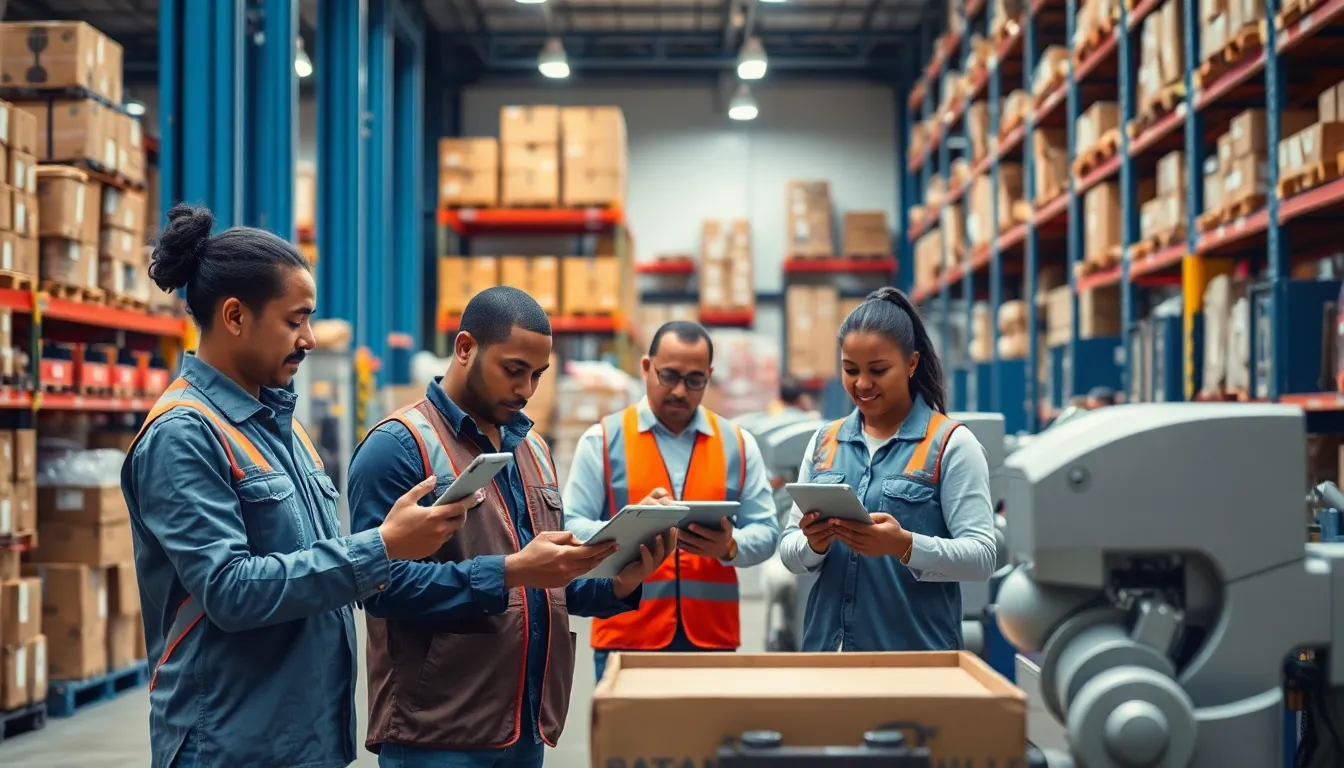Table of Contents
ToggleIn today’s fast-paced world, the supply chain is like a game of Jenga—one wrong move and everything comes crashing down. But fear not! Emerging supply chain technologies are here to save the day, transforming chaos into seamless efficiency. From smart warehouses to AI-driven logistics, these innovations are revolutionizing how businesses operate.
Overview of Emerging Supply Chain Technologies
Emerging supply chain technologies significantly enhance operational efficiency. Innovations like smart warehouses streamline inventory management and reduce shipping times. Artificial intelligence plays a crucial role in logistics, optimizing routes and forecasting demand. Blockchain technology provides transparency and security in transactions, thereby increasing trust among stakeholders.
Robotics automation in warehouses allows for faster order fulfillment. Companies can process higher volumes of goods with fewer errors while maintaining quality control. Internet of Things devices offer real-time tracking of shipments, enabling proactive decision-making. Machine learning algorithms analyze data patterns, helping businesses adapt to market fluctuations.
Drones and autonomous vehicles are starting to deliver goods directly to consumers. This technology reduces reliance on traditional transportation, lowering costs and improving delivery speed. Advanced analytics tools provide insights into supply chain performance, enabling businesses to identify inefficiencies.
3D printing technologies facilitate on-demand manufacturing, minimizing waste and inventory costs. This innovation allows for rapid prototyping and product customization. Cloud-based platforms enhance collaboration among supply chain partners, resulting in improved communication and coordination.
Overall, these technologies play vital roles in transforming supply chain operations. They collectively contribute to creating more resilient and agile supply chains. Businesses adopting these technologies gain a competitive advantage in an increasingly complex market.
Artificial Intelligence in Supply Chain Management

Artificial Intelligence (AI) significantly transforms supply chain management by enhancing decision-making and increasing efficiency. Companies leverage AI technologies to optimize various aspects of their operations.
Predictive Analytics
Predictive analytics empowers organizations to forecast demand accurately. By analyzing historical data, AI identifies patterns and trends, leading to informed inventory management decisions. Increased accuracy in demand forecasting reduces excess stock and minimizes stockouts. Moreover, predictive insights help businesses respond swiftly to changing market conditions and customer preferences. Many companies report a reduction in carrying costs due to better inventory alignment, which translates into improved cash flow.
Automation and Robotics
Automation and robotics streamline supply chain processes through AI integration. Robotics enhances order fulfillment accuracy and speeds up picking operations in warehouses. The deployment of AI-driven robotic systems allows for round-the-clock productivity without fatigue. Enhanced efficiency decreases labor costs and improves overall service delivery rates. Additionally, these technologies support precise inventory tracking, making it easier for businesses to maintain optimal stock levels while reducing operational risks. Companies adopting automation experience significant productivity gains and a noticeable increase in customer satisfaction.
Blockchain Technology in Supply Chains
Blockchain technology plays a significant role in enhancing efficiency within supply chains by providing a secure, decentralized method for recording transactions. It enables all parties involved to access the same real-time data, fostering trust among stakeholders.
Enhancing Transparency
Transparency improves through blockchain’s immutable ledger. Each transaction is recorded in a way that cannot be altered, ensuring data integrity. Companies gain immediate visibility into each step of the supply chain, allowing them to verify product origins and authenticity seamlessly. This level of openness reduces the risk of fraud and errors while promoting accountability among partners. Additionally, customers appreciate knowing where their products come from, which can enhance brand loyalty.
Improving Traceability
Traceability significantly benefits from blockchain technology as it provides detailed records of a product’s journey. Each movement within the supply chain is tracked, offering insights into potential delays or complications. This ability to trace components back to their source allows companies to respond quickly to quality issues or recalls. In industries like food and pharmaceuticals, this level of traceability ensures compliance with regulations while safeguarding public health. Overall, using blockchain streamlines the process of tracking and tracing products, ensuring quality and efficiency.
Internet of Things (IoT) Applications
The Internet of Things (IoT) plays a pivotal role in modern supply chains, providing innovative solutions that enhance efficiency and visibility.
Real-Time Tracking
Real-time tracking of shipments significantly improves logistics operations. Sensors placed on shipping containers, vehicles, or products transmit data, allowing companies to monitor the exact location at any moment. Businesses benefit from reduced delays and accurate ETAs, increasing customer satisfaction. For instance, organizations can proactively address potential disruptions when they receive alerts about delays in transit. Monitoring temperature and humidity via IoT devices is critical for industries like pharmaceuticals and food, ensuring compliance with safety standards. This proactive approach transforms supply chain management, fostering trust between businesses and consumers.
Smart Warehousing
Smart warehousing incorporates IoT technology to optimize inventory management and streamline operations. Automated systems track items, providing real-time data on stock levels and location. Each development enhances order accuracy and fulfillment speed, significantly reducing human error. Advanced analytics from IoT sensors facilitate better decision-making about inventory replenishment and storage. For example, companies utilize data to determine optimal placement for fast-moving items, minimizing retrieval time. The integration of robotics in smart warehouses complements IoT applications, enhancing the picking process and increasing productivity. These advancements lead to substantial cost savings and improved overall efficiency in supply chain management.
Advanced Data Analytics
Advanced data analytics transforms supply chain operations by enabling organizations to extract valuable insights from extensive datasets. This practice leads to improved decision-making and enhanced efficiency across various supply chain activities.
Big Data in Supply Chain Optimization
Big data plays a vital role in supply chain optimization. Organizations can analyze vast quantities of information from diverse sources, such as customer preferences and inventory levels. They identify trends and patterns that enhance demand forecasting accuracy. Furthermore, real-time data allows for agile inventory management. As a result, companies can minimize excess stock while meeting customer needs effectively. These insights promote strategic planning that aligns resources with market demands.
Machine Learning Algorithms
Machine learning algorithms significantly enhance supply chain processes. These algorithms learn from historical data and continuously improve decision-making capabilities. By analyzing past trends, they optimize routing and reduce transportation costs. Additionally, advanced forecasting models predict future demand more reliably. Companies using machine learning achieve higher accuracy in restocking and reduce waste. Deployment of these algorithms leads to improved supply chain resilience, ultimately enhancing customer satisfaction.
Emerging supply chain technologies are revolutionizing the way businesses operate. By leveraging innovations like AI, blockchain, and IoT, companies can enhance efficiency and resilience in their supply chains. These advancements not only streamline processes but also improve transparency and customer satisfaction.
As organizations adapt to these technologies, they position themselves for success in a competitive landscape. The future of supply chains lies in embracing these tools to create agile and responsive operations. By doing so, businesses can navigate challenges more effectively and seize new opportunities for growth.




